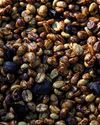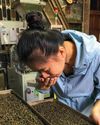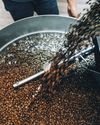試す 金 - 無料
Here Comes The Science Bit
Caffeine
|April - May 2018
In winning the 2017 World Barista Championship, Dale Harris made use of the latest technology to analyse aromatics. Here he explains the process

People are drawn to speciality coffee for many reasons: the culture, the people, the brands, the sense of belonging. The industry hopes to attract customers by promising that coffee can taste different. Actually, it promises more: that coffee can taste much better than people expect and that it has a diversity of flavours beyond those offered by almost all other products.
At some point, most people have been entranced by the complex flavours and aromas of coffee. They may not be able to explain why this is, but there are solid, scientific reasons.
When simple amino acids – the fuel cells built by biological actions in plants and animals – are exposed to a certain level of heat for the right amount of time, they are transformed into a complex range of aromatic compounds. This is known as the Maillard reaction and is what happens when coffee is roasted, bread baked, steak grilled and onions sweated. Humans respond to these complex webs of aromas.
The process is a series of reactions, and each part of this sequence can produce different compounds dependent on the substances present at that stage, precise temperature, pH and other factors. The complexity of green coffee contributes to this diversity: it contains different starches, sugars and proteins dependent on the mineral content of the soil in which it was grown, the length and consistency of its maturation, and even the way the seed was released from the cherry and dried.
このストーリーは、Caffeine の April - May 2018 版からのものです。
Magzter GOLD を購読すると、厳選された何千ものプレミアム記事や、10,000 以上の雑誌や新聞にアクセスできます。
すでに購読者ですか? サインイン
Caffeine からのその他のストーリー

Caffeine
The Future Of Decaf?
A US company claims its pouch extracts caffeine without harming flavour
1 min
Issue 42

Caffeine
Great Coffee Shouldn't Cost The Earth
Caffeine’s editor-at-large Tim Ridley explains how to lower the environmental impact of your coffee-drinking habit
4 mins
Issue 42

Caffeine
What The F**k...Is Honey Processing?
Apart from natural and washed coffees sits a whole other category, as Sierra Wen Xin Yeo explains
3 mins
Issue 42

Caffeine
The grind
SEASONAL COFFEE
1 mins
Issue 42

Caffeine
Tea with purpose
Michelle and Rob Comins explain how tea can be a force for good
2 mins
Issue 42

Caffeine
Ten years on
We celebrate the London Coffee Festival’s first decade with a look at its successes
3 mins
Issue 42

Caffeine
Chocolate and espresso pavlova with fennel roasted grapes
This year I’m giving coffee centre stage on the Christmas dessert table. I firmly believe coffee shouldn’t just be an afterthought to accompany dessert, it should be the dessert – but aside from that, it just makes sense.
2 mins
Issue 42

Caffeine
Bitter Barista
Latte art competitions have been milking it for too long – they used to be fun, but now their focus on the wrong things is harming barista skills, says our cantankerous columnist
3 mins
Issue 42

Caffeine
What The F**k ...Is The Maillard Reaction?
It’s just one of the elements you need to know about if you’re going to roast coffee successfully, as Edgaras Juška explains
2 mins
Issue 41

Caffeine
Work Wonders
Coffee gets people through the working day. So it stands to reason that better coffee produces better work – and in some places the two are in perfect harmony, says Phil Wain
4 mins
Issue 41
Translate
Change font size
